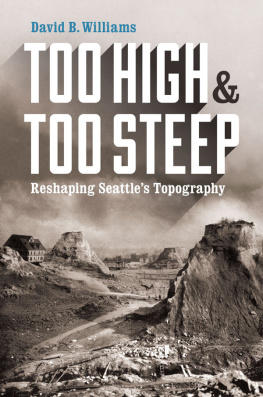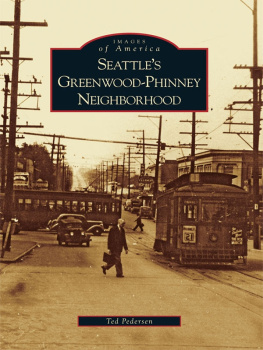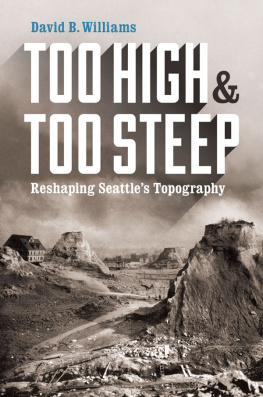
TOO HIGH & TOO STEEP

Eli S. Glovers Birds-Eye View of the City of Seattle, 1878 (detail).
David B. Williams
TOO HIGH & TOO STEEP
Reshaping Seattles Topography
UNIVERSITY OF WASHINGTON PRESS Seattle and London
Too High and Too Steep was published with the support of the NORTHWEST WRITERS FUND, which promotes the work of some of the regions most talented nonfiction writers and was established through generous gifts from Linda and Peter Capell, Janet and John Creighton, Ruth and Alvin Eller, James A. and Katherine M. Nelson, Michael J. Repass, Linda Chalker-Scott and Jim Scott, Charyl Kay and Earl Sedlik, Robert Wack, Jacqueline B. Williams, and other donors.

| This publication was also supported by a grant from the 4Culture Heritage Special Projects program. |
2015 by the University of Washington Press
Printed and bound in the U.S.A.
Design by Thomas Eykemans
Composed in Chaparral, typeface designed by Carol Twombly
Display type set in Duke, designed by James T. Edmondson
18 17 16 15 5 4 3 2 1
UNIVERSITY OF WASHINGTON PRESS
www.washington.edu/uwpress
ENDPAPERS: (front) Augustus Koch, 1891 Birds Eye View of Seattle, Library of Congress, Geography and Map Division. (back) B. Dudley Stuart, Seattles Coming Retail and Apartment-House District, courtesy University of Washington Special Collections, G 4284 S4:2D46 A3 1917 S72.
EPIGRAPHS: Enclosure to a letter from Reginald H. Thomson to William McLeod Raine, July 31, 1911, Reginald H. Thomson Papers, Box 4, Book 10, Letter 549, Accession 0089001, University of Washington Special Collections; George S. Turnbull, Moving Mountains into the Sea, The Northwest 1, no. 1 (May 1907): 714.
LIBRARY OF CONGRESS CATALOGING-IN-PUBLICATION DATA
Williams, David B., 1965.
Too high and too steep : reshaping Seattles topography / David B. Williams.
pages. cm.
Includes bibliographical references and index.
ISBN 978-0-295-99504-5 (hardcover : alk. paper)
1. Geotechnical engineeringWashington (State)SeattleHistory. 2. EarthworkWashington (State)SeattleHistory. 3. GeologyWashington (State) I. Title.
TA705.3.W2W55 2015
624.1'5109797772dc23
2015013226
The paper used in this publication is acid-free and meets the minimum requirements of American National Standard for Information SciencesPermanence of Paper for Printed Library Materials, ANSI Z39.481984.
All rights reserved. No part of this publication may be reproduced or transmitted in any form or by any means, electronic or mechanical, including photocopy, recording, or any information storage or retrieval system, without permission in writing from the publisher.
For my mom, whose inspiration and support have been boundless and whose passion for history set me on the path to write this book
Seattle is builded on a group of hills lying between Puget Sound and Lake Washington. These hills are said to be glacial moraines; any way they do not lie in any orderly shape or manner; some of them stretch northerly and southerly, others easterly and westerly. These east and west hills are the ones which have given Mr. Thomson the most trouble. He says that nature intended the main traffic of the Pacific Coast to move northerly and southerly, and so when a glacier dropped a moraine across that course, that some one was sleeping and that the labor of removing the obstruction had been thrust upon us.
Reginald Heber Thomson, city engineer, July 31, 1911
Denny Hill has been marked for slaughter. [The] beautiful face of the country [has] been disfigured to suit the inexorable demands of commerce. These hills were placed here by nature; it was never intended that they should be marred. That was the old spirit. Times have changed. Hills that would be permanent in other places are attacked and removed[,] the steam shovel, dauntless, inexorable, beating tirelessly, against the massive side of the hill.
The dirt hill is doomed. [A] gunner training his piece on a hostile fort attack[s] the most vulnerable point of the enemy. Night and day the ceaseless fight proceeds. It is a one-sided contest. It is for progress; it is an outgrowth, a characteristic expression, of the Seattle Spirit.
George S. Turnbull, The Northwest, May 1907
Contents
Illustrations
Preface
When I was a child, my father worked with Brewster Denny, great-grandson of one of Seattles founding fathers, Arthur Denny. I thought this was pretty neat, and I remember interviewing Brewster in third grade for an assignment I had on Seattle history. I dont know if it was during this interview or later in life, but at some point I learned that Brewster had known Arthurs son Rolland, who was six weeks old when the schooner Exact dropped off the twenty-two people considered to be Seattles founding families. I was amazed that I knew someone who knew someone who had actually arrived on the boat that started the story of Seattle. It led to my lifelong enthusiasm for Seattle and its stories. That connection to the Denny family also cemented the idea that I live in a place with a relatively short history that is both accessible and tangible.
As I got older, I continued to be fascinated with Seattles past, and I tried to weave that passion into a previous book, The Seattle Street-Smart Naturalist: Field Notes from the City. My goal was to explore the intersection between people and the natural world in what many call the least wild place on earth, the urban environment, while at the same time considering Seattles historical connections to this theme. One of my favorite chapters was about the seven hills of Seattle: how they formed during the last ice age, and how they have influenced our actions in the modern city.
Too High and Too Steep: Reshaping Seattles Topography is an outgrowth of my seven-hills chapter; in it I tell the story of Seattle through its topography. Those of us who grew up in Seattle with duck-and-cover earthquake drills and the eruption of Mount Saint Helens learned more viscerally than children in more stable locations that geologic forces played, and still play, a significant role in shaping the landscape. What we didnt always learn is the extent to which humans have been a critical force in altering the environment. By making changes ranging from lopping off hills to covering over tideflats to reengineering lakes, Seattleites have created a surprisingly unnatural landscape that affected city residents in the past and still affects us every day, often in ways we do not perceive. This is the subject of my book.
Despite all the changes to the landscape, there is little evidence obvious to the casual observer that shows how we have reshaped the topography. With some sleuthing, though, stories can be unearthed that reveal the changes our predecessors made. The stories can be seen in parking lots where cars sit catawampus to each other because the ground underneath is a former tidal swamp, and in train tracks that make a broad sweep instead of going straight because the tracks were laid before the lowering of Lake Washington. The stories can be found in borehole cores filled with the detritus of bygone industries and in early newspaper accounts of the drama of a young town determined to be a big city.
Next page













